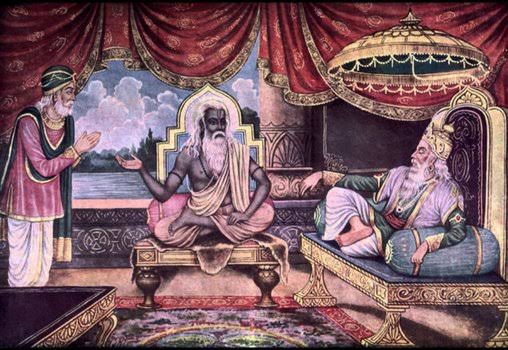The politics of the present time is a parasite. It is responsible for the creation of mass hysteria all over the world. But I don’t care much about the politics operating around me. What I do care about is how it is using religion to tame the entire population. Those who do not want to get tamed move away from religion of almost every kind. So the most used statement in the present political environment (often considered to be an important one), which is also used mostly by activists, who want to go against the politics of violence and division is: “I am an atheist.”
They convert the theism in them into atheism, and as a result, they start believing that they can easily become great activists and individuals with values and ethics. The irony lies in the fact that they never try to understand the type of atheism they’re following. Rather they believe that the problem always lies with religion, and only religion. So they either cherrypick instances thinking that they can burst the bubble of religion, or they quote atheists of one kind (mostly Western) to convince everyone that multiple intellectuals have understood the problem, so what they believe is right.
But it is equally the fault of those who believe in their religion without knowing the philosophy behind the words of the great masters. They become narcissists, and start hating other religions just to become scholars or critics. So if someone says, “Jesus is for everyone, those who want to accept will accept. Those who don’t want to, they won’t”, they take it as arrogance without knowing that Jesus wasn’t even taken seriously when he visited Jerusalem, since everyone knew him from birth. Often we hate to accept that someone very close to us is doing great things for the jealousy inside us that we keep on watering. The same happened with Buddha, Chaitanya, and others.
If someone is an atheist, then it is necessary that one should really know whether s/he is subscribing to the Eastern or Western schools of Atheism, as the former one accepts the existence above negation of the Almighty whereas the latter one is growing constantly by negating everything associated with religion and religious individuals. If any philosophy negates anything, then there’s no chance for development. The same thing happens when one starts identifying himself/herself as an atheist by negating existence, and subsequently becomes a hypocrite when it comes to cherrypicking the religion s/he wants to negate for the sake of the politics of atheism. I will come to that later. Let’s understand the basic schools and proponents of Eastern Nastikata (or whether they’re really nastik according to the modern world).
- Vardhamana, the 24th Tirthankara
It is very interesting that Jainism is one of the most valued religions of the present time, but Vardhamana or Mahavira never used to talk about any superficial element which exists up there in heaven or swarga, but is the one master who used to believe in what Sanatana calls Godliness in the truest sense. Therefore, if we go through the Jain texts, we can easily find that Mahavira is constantly preaching about the presence of the elements of prakriti in the most physical beings around us. Mahavira doesn’t speak about the creator but equally doesn’t criticize if anyone is believing in Brahma, Allah or anyone else. So, if we visit Dharamsthala in Karnataka, we can easily find a temple of Shiva around people who believe in Vardhamana. If I start calling Mahavira an atheist, then it won’t be a lie, and if I don’t, then it won’t be a lie too.
This is the beauty of the Eastern Schools of Nastikata. Any modern day Nastik who’s actually negating Astha or faith isn’t a Nastik. A seeker should have faith, and so a Nastik always inspects ‘Astha’ (if it’s legible or not) and then starts believing in it, or else Mahavira could have negated even this whole existence and how the energy of the biggest star lies in the tiniest particle of the sand of a planet. His ‘astha’ or faith is towards the fact that everything is alive and their lives deserves my respect and faith. So, even if he believes that there’s no creator, he accepts that there’s energy and this energy is to be questioned. He didn’t stop Dhyana or his meditation as he wanted to understand the energy, to finally immerse himself in it. The query itself speaks about his rationality, a questioning mind he used to have and, along with it, his act of believing in Godliness even if he tried to negate or reject the Almighty in almost every way.
- Charvaka School of Philosophy
Perhaps one of the most discussed and studied schools in Nastikata is the one started by Charvaka. Interestingly, it is still a school of the Sanatana Dharma, as Charvaka wanted to live the life of a Sanatani (a seeker) even by being a Nastik. None from the Sanatana Dharma ever wrote against this school of thought as it spoke of the same thing that many Sanatani speak by referring to a deity or a human form of God. Charvaka rejects the Vedas and the oppression of the Brahmins, but accepts the Brahman, and the presence of the material form of knowledge, which the Vedas do not subscribe to, but the Upanishads do. Also, in many ways, Charvaka also rejects the concept of an afterlife, which is mostly responsible for the creation of fear, superstitions and a negative perspective towards death.
His Nastikata was towards the form of God we created, but actually accepted the law of ‘Aham-Brahmasmi’, and also how the people of the pre-Vedic period used to perceive the divine. When a Sanatani like Vatsyayana wrote about pleasure, he actually kept the concept of Charvaka in the forefront, as he used to believe that a human being is nothing without pleasure. Krishnamurti (UG, not JK) said:
“Everybody says, ‘Do not get angry’ – I am angry all the time, I am full of brutal activities, so that is false. What these people are telling me I should be like is something false, and because it is false it will falsify me. I don’t want to live the life of a false person. I am greedy, and non-greed is what they’re talking about. There is something wrong somewhere”.
This is what the Eastern school of Nastikata actually sounds like. To keep on questioning without negating the thought of the five elements and the divine. Knowledge that’s perceived in the first hand is real knowledge and when Savarkar distributed Upanishads and Vedas to more than a thousand students, he was just following Charvaka (maybe unconsciously) since he wanted people (mostly children) to know what’s written in the texts. Similarly, Tantra is all about practice, and even the greatest scholars of Tantra believe that their disciples would know Tantra only when they start practicing the different forms of obtaining the hidden energy. This is what Charvaka said using a materialistic lens, whereas the Tantra and Shaivite schools of Sanatana Dharma said the same using Devi and Shiva respectively.
- Buddha
Buddha, to me, is the greatest theist this world has ever seen, but for many of his followers he is a brutal atheist. Many theories have been written about the fact that what Buddha understood after attaining enlightenment. Many of the greatest philosophers said that he understood that there’s no God, and so he started teaching his students about the meaning of existence and what their role should be in this world. The Vajrayana, Mahayana and Nichiren schools of Buddhism came out openly by accepting him as the enlightened one, and then after a few years, his followers from these schools started to consider him as God. Mahayana made him appear as someone who has got supernatural powers, multiple hands and skin color of different kinds. Nichiren Buddhism, on the other hand, started believing in mantras and I have a first-hand experience where one of the followers of the school said, “Chant the mantra,Namu Myōhō Renge Kyō, (南無妙法蓮華経) and everything will be well”. Although I understand, as a Sanatani, that mantras have an indirect influence on our minds but the thing that Buddha never wanted was verbal orientation, which with time, started growing in Buddhism.
Buddha believed in Dhammapada. Some may say that Dhamma is the physics or ultimate law of this universe. Others may call it justice. Buddha said that Dhamma is Dhamma (you may call it God or anything else). He liked to associate it with codes and conduct of natural existence. Also, the discipline that we cultivate inside us using our energy system is also Dhamma. Now, according to other Eastern schools of philosophy, Buddha is speaking about God, by not speaking about God. It is still interesting that he was conscious that people would use God in their own way and hence his teachings wouldn’t be of any use, so he spoke about Dhamma and kept it associated with so many different meanings. People will relate to it the way s/he feels, and so, even though people understand Buddha as a nastik, many won’t agree with the same. The diversity of thought in the words of Buddha makes him a proponent of both Astikata and Nastikata.
- Nietzsche and Zarathustra
Many people consider Zarathustra as a creation of Nietzsche, the great European philosopher cum atheist cum nihilist. It is an irony that a nihilist wrote about one of the greatest optimists. Zoroastrianism is one of the smallest religions that exists on this Earth, and Zarathustra is referred to as the God who was laughing when he came out of his mother’s womb. His smile itself can be referred to as a metaphor that speaks about the optimism he later revealed before everyone. Zarathustra attained enlightenment and, unlike other saints and philosophers, he came back to his own village to share whatever he learnt by becoming enlightened. Nietzsche was a self-proclaimed atheist and nihilist, so naturally he wrote about Zarathustra using his mind, but it is so unfortunate that no one tried to write about him before this great nihilist.
The only mistake that Nietzsche made was that he called Zarathustra a superhuman. He just did something which resembled what the Mahayana Buddhists did with Buddha. If we go by the words of Nietzsche, then Zarathustra would be someone who negated the idea of the divine and used to consider man to be the one who could cultivate everything inside him to become the divine. How is it different when Krishna asks Arjuna to awaken himself because he has the gifts of God? Or how is it not okay to say that Zarathustra simply said what Karma Yoga already said a thousand years back? It won’t be different, but what would be different is that the Zoroastrians do not believe in idol worship. They cannot be referred to as men of faith as Zarathustra was a ‘superhuman’ of questions. It is the quality of an atheist to believe in questioning, even the divine Charvaka, Buddha, Mahavira and Zarathustra kept on doing in their own way or methods.
- The Western School of Atheism
From Satre to Richard Dawkins, everyone spoke about atheism by keeping the monotheistic religion in the mind. Even Marx and all his followers spoke about atheism without even reading what Eastern School of Atheism had to say. If you go through Richard Dawkins’ The God Delusion, you’d see how he is constantly speaking against the binary nature of monotheism. He spoke against Islam and Christianity but it is so unfortunate that most of the people who belong from a society where sufficient number of books are available on the philosophy of a polytheistic religion like Sanatana Dharma, got influenced by Richard to then become ‘self-proclaimed atheists’.
The same happened when Marx quoted that religion is the opium of the masses. He didn’t go through the already communist Sanatana Dharma, which broke the rules of a society that’s orthodox and patriarchal. The post-Manusmriti age of Sanatana Dharma can only be criticized and negated by the thoughts of the pre-Manusmriti Sanatana Dharma with Vedas and Upanishads as the knowledge providers. But sadly, different individuals with different role models started believing that someone who’s offering a thought that’s working in a monotheistic society would easily work for a society that believes in multiple deities operating on different energy levels and in synergy with science. Sadly, people became colonially influenced and Marx’s thought started working in a non-binary, non-dual society. Isn’t it weird, amusing and unfortunate?
Today when someone speaks about atheism, s/he cannot keep his/her atheism without speaking about Marx or Dawkins or Satre or the Four Horsemen (Dawkins being one of them). But what’s common among all of these scholars is that they come from a society that believes in “God or no God”, “black and white”, “good and evil” and the philosophy they’re trying to propagate is completely based on the society they grew up in. Therefore, when anyone from Bharata speaks about atheism, s/he cannot keep them as their role models as they have nothing in them to speak against the Brahman or the Sanatana of a Sanatani. It is very easy for someone who’s living her/his life by being a monotheist to become an atheist. But if it is too easy for a polytheist person to become an atheist, then know that something is wrong with the person or the society, not with the philosophy. The objective of Charvaka, Buddha or Mahavira was to educate and enlighten people. They never wanted to become superhumans or Gods, so if you’re using their ideas to counter the philosophy of Sanatana Dharma, then maybe you’ve some valid statements since all of them have lived the life of a Sanatani. It isn’t easy to negate the divine. It requires real enlightenment. Period.
*









Add comment